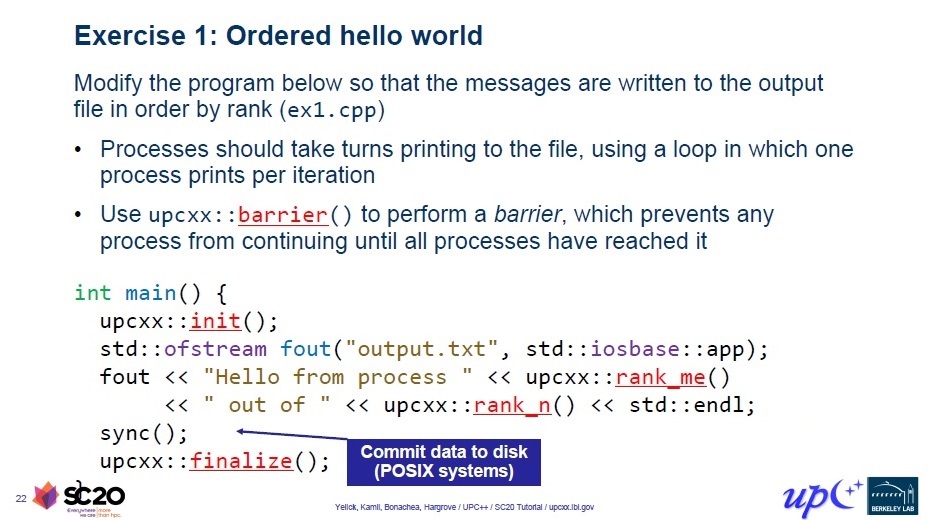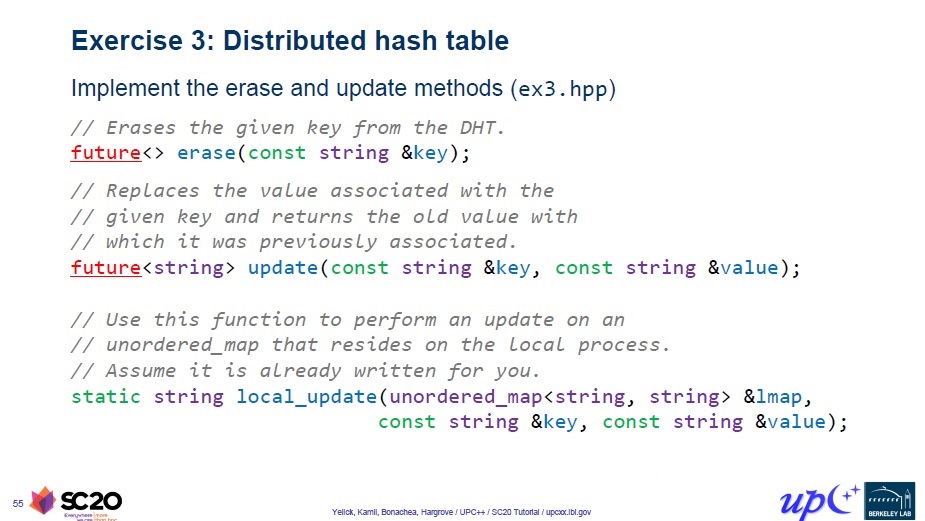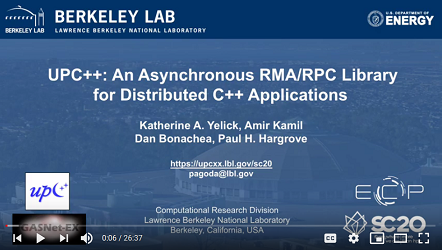Wiki
Clone wikiupcxx / events / SC20
UPC++ SC20 Virtual Tutorial
The Pagoda project was pleased to present a half-day UPC++ Tutorial at the virtual SC20 conference on November 10th, 2020. The tutorial includes interactive hands-on exercises along with an introduction to the UPC++ library and in-depth case studies of three applications using UPC++. Speakers notably include Professor Katherine Yelick, a highly distinguished lecturer and internationally recognized and decorat ed researcher.
Note this is an older version of a tutorial which was subsequently presented at SC21.
Watching the Video
The on-demand videos provided by SC20 expired in May 2021. However, you can still watch the pre-recorded video segments of the tutorial on YouTube:
The YouTube version omits the live Q&A segments that are copyrighted by IEEE/ACM.
Preparation
Setting up UPC++
There are several ways to access a working UPC++ environment:
Installs on the major DOE centers
We maintain public installs of UPC++ at several DOE centers.
See Using UPC++ on NERSC Cori, OLCF Summit, and ALCF Theta
Download and install from source
UPC++ supports a wide range of UNIX-like systems and architectures, ranging from supercomputers to laptops, including Linux, macOS and Windows 10 (via WSL).
Visit the UPC++ download page for links to download and install UPC++ on your own system.
Docker containers with UPC++
We're providing a Linux Docker container for the UPC++ tutorial.
Assuming you have a Linux-compatible Docker environment, you can get a working UPC++ environment with the following command:
docker run -it --rm upcxx/sc20-linux-amd64
The UPC++ commands are upcxx (compiler wrapper) and upcxx-run (run wrapper), and the home directory contains the tutorial exercises and some example codes.
Getting Started with the Library
For training materials to get started using UPC++, see the UPC++ Training Page
Day of Tutorial
- Tutorial Slides (PDF)
- The SC20 On-demand stream for the UPC++ Tutorial is no longer available. Please see the YouTube video above.
Setting up the Hands-on Exercises
-
Install or find a working UPC++ environment (see above)
-
Download the tutorial content, which includes the starter files for exercises. The tutorial content is available in all of the following places:
- Inside the Docker container above (Docker users can skip this step)
- Download the archive for this tutorial: tar gzipped or zip file
- Git clone from this BitBucket repository
- Extract from SC20 Tutorial Notes archive (800MB, login required)
- Credentials were provided in email around Nov 4 titled "SC20 Tutorial Notes Download Available"
-
Navigate to the
exercisesdirectory (possiblytutorials/2020-11/exercises) -
The sections below describe each example in more detail
Exercise 0
Exercise 0 just tests you have a working UPC++ environment.
From the exercises directory of the tutorial materials, type this command to build and run hello world:
make run-ex0
This will build and run hello world using the default network backend. Note that on batch scheduled supercomputers this must be run inside a batch session.
You should see output similar to:
/usr/local/upcxx/bin/upcxx -Wall ex0.cpp -o ex0 /usr/local/upcxx/bin/upcxx-run -n 4 ./ex0 Hello world from process 1 out of 4 processes Hello world from process 2 out of 4 processes Hello world from process 3 out of 4 processes Hello world from process 0 out of 4 processes
Troubleshooting:
-
make: upcxx: Command not foundThis means the UPC++ install was not found in your environment. You can either add the UPC++bindirectory to your$PATHvariable, or set environment variable to the root of the UPC++ install:export UPCXX_INSTALL=/path/to/upcxx/install/tree -
Job spawn failures (e.g.
ssh: connect to host foo port 22: Connection refused). If you failed to launch a distributed job, the simplest resolution for the purposes of the tutorial exercises is to recompile for the single-node SMP backend, using the command:env UPCXX_NETWORK=smp make clean run-ex0Assuming this fixes your problem, use a similar command for running the subsequent exercises (replacingrun-ex0withrun-ex1, etc.)
Exercise 1
Working source file: ex1.cpp in exercises directory
Make command: make run-ex1 in exercises directory

Correct Output: Output lines in a correct solution should be ordered by rank.
output.txt : Hello from process 0 out of 4 Hello from process 1 out of 4 Hello from process 2 out of 4 Hello from process 3 out of 4
Exercise 2
Working source file: ex2.cpp in exercises directory
Make command: make run-ex2 in exercises directory

Correct Output:
Running 1-d Jacobi on 4 procs, iters=100 global_domain_sz=1024 Running jacobi_rget... result = 51900 PASSED Running jacobi_rput... result = 51900 PASSED SUCCESS
Exercise 3
Working source file: ex3.hpp in exercises directory
Make command: make run-ex3 in exercises directory

Correct Output:
erase() SUCCESS update() SUCCESS
Extra Credit: Exercise 4
If you finish early, there is an optional exercise 4 (not explicitly covered during the presentation). This exercise asks you to fill in code for a more advanced version of a distributed hash table that uses RMA to accelerate transfers of large value data (exploiting zero-copy RDMA on systems where that's available).
Working source file: ex4.hpp in exercises directory.
Search for EXERCISE in the file for detailed instructions.
Make command: make run-ex4 in exercises directory
Correct Output:
Constructing a DistrRMAMap<uint64_t,uint64_t>... Inserting 100 key/value pairs from each of 4 ranks, with value sizes 8..800000 bytes... Inserts complete! Now issuing 100 finds from 4 ranks to verify... Find complete! Testing insert collision... SUCCESS
Thanks for attending the UPC++ Tutorial!!!
Updated
